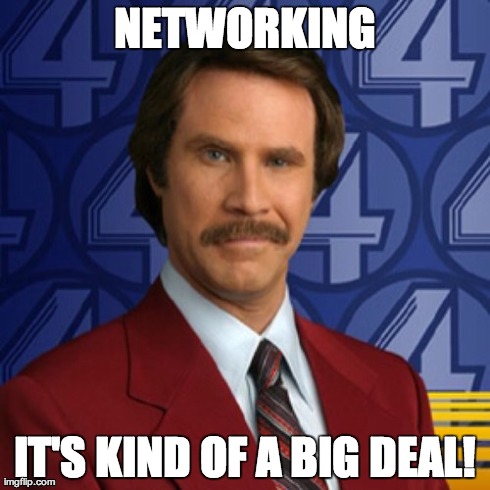Building Your Professional Network by Informational Interviewing
With the Spring Career Fair (February 4-5) and the Impact Career Fair (February 26) coming up, I wanted to share some advice. This is advice I’ve given to many students and much of it comes from talking to our alumni. To all students, I would definitely encourage you–whether or not you are looking for a job or internship–to go and visit the Career Fair. I’d also encourage you to look carefully into the companies. Many organizations and jobs are “hidden” opportunities. Don’t assume a company is not “in your field” or that a company doesn’t have jobs for “students like you”. They probably do.
But, many jobs and internships come from outside the Career Fair setting. I’m going to start today with just one word for you—networking. We tell you to do it. But how do you get started? Here’s what I tell students to do:
- Sit down and make a list of every person you know in the field where you want to work (your family friends, your relatives (aunts, uncles, etc)., a neighbor or recent alumni.) If you are struggling, ask your parents or relatives to give you 5 names of people they know. Do the same for 1 or 2 faculty members.
- Reach out to fellow students and recent alumni, ask if they could share 5 names.
- Go to every career event, alumni speaker, etc.. Get a business card from the speaker every time. Go to the Career Fair and speak to someone at as many tables as you can. Get their business card. You never know who will be the important connection.
From those three things you can easily generate a least of 10-20 people to start your network. Now, if the contact name came from a specific person, it’s good practice to ask them for permission to contact those people, asking if it is OK to say that you were referred by the individual who gave the name.
Call, email, contact through LinkedIn or set up an in-person meeting with the person you want to meet. Indicate through this contact that you are trying to sort out your career options and asking if they would share their expertise. Be clear. You are NOT looking for a job or internship. If you present this contact as a job search, if they don’t have any jobs available, they will tell you that. You ARE looking for their career advice because someone they know has recommended them to you.
This is what we call an informational interview. You’re not looking for a job or internship, you’re just trying to learn. From my experience at least many will agree to answer questions by email, phone or in person. Develop a standard set of 2-3 questions, as well as 1 or 2 specific about their company or job. Some potential questions might be:
- Tell me what your typical day is like and what you like best about it?
- What were the early career experiences that helped you get to your current position?
- What do you see as the most important skills for a new employee in your company?
At the end of every conversation say: “Thank you for your time. Could you refer me to two or three other people who might be able to answer some of my questions?” And then you’ll seek out an information interview with those contacts.
As you do this, your networking list will grow from 5 or 10 or 20 to 25 to 50 to 100. Now comes the hard part. You have to maintain a relationship with these people. So follow-up. Let’s say you have 40 people now in your network. Each week, you are going to reach out to 5-10 to them. It just has to be a short note updating them on what you are doing, asking their advice on a class assignment, or seeking their thoughts on an interesting story you saw in the news or heard about their company. Your goal should be to interact with each of them over the course of 1-2 months, creating a sustainable connection.
If you have invested in building a real relationship like this, by the time you are ready to do your job or internship search, you’ll have a great group of people to lend their help.
